I probably spend way too much time thinking about elections. I suspect you think so too, particularly since I’ve devoted so many blog posts to the subject. I even talked about it a lot on my short-lived political podcast, Strange Sound, though not so anyone would hear. The fact is, I kind of hate elections. They’re nerve-wracking as hell, they often turn out badly, and I’m not a big fan of suspense, especially when it runs all night long. But that’s just experience talking – long, bitter experience.
There are many things we can do that are more important than voting. Mutual aid, organizing, public service … all of these things make an immediate difference for people. But more than one thing can be important at the same time, and my contention has always been that voting is important enough to do, even if it isn’t as important as all that other stuff. For people like me – CIS-gender white males – the time commitment involved is negligible.
So, though I’m not a huge NPR fan, I was excited when I heard that a recent Serial Podcast had centered on elections in North Carolina and purported voter fraud. But after listening to it, I can only say that they kind of hid the ball. Or dropped it. Not sure which.
Organizing is the enemy
Without getting too deep in the weeds of the podcast, The Improvement Association – a co-production of NPR’s This American Life / Serial and the New York Times – talks about a political action committee in Bladen County, North Carolina that does get-out-the-vote efforts for black residents. They basically hand out a sample ballot with their recommendations and encourage people to support their list. In short, this is organizing 101, completely legal and above board, and a really effective way to drive turnout and support for Democratic candidates.
Naturally, the Association is under constant attack by white politicians, who accuse the organizers of voter fraud. They basically gaslight the organization, so that when an actual Republican voter fraud scheme is busted, somehow this black organization’s name is dragged into the conversation both on a local and a statewide level. The white people in this story – mostly Republicans – understand the power of this black voting block, and they’re using the tools available to them (i.e. baseless accusations of cheating) to undermine it. What is more of a threat to white power than organized black people?
Strange focus
What kind of astonishes me about this podcast is the degree to which the reporter, Zoe Chase, gets sidetracked by this internal power struggle within the PAC. Now, it should come as a surprise to no one that organizers and political agitators tend to have egos. It seems likely that the two lead organizers, Horace and Cogdell, push to get their own way in the context of the organization. But if the ultimate goal is more power and resources for black people in the sea of white people known as North Carolina, is this all that bad?
Chase follows Cogdell’s efforts to elect three black councilmembers in a little town named Elizabethtown – a majority black community run by rich, white people, where there is virtually no public investment in the black neighborhoods. Chase spends a lot of time on the critics’ accusation that Cogdell is doing this so that he will be able to control these three black women on the town council. In the end, Cogdell’s candidates lose, and his colleague Horace suggests that this was essentially because black people were voting against their own interests for one reason or another. This is Chase’s take on Horace:
“It’s always zero sum with Horace when it comes to politics. I’ve learned that. If you’re not with him, you’re against him. And if you’re against him, you’re wrong.“
The thing that must not be named
On the other hand, what I hear from Cogdell is a pretty reasonable economic, almost Marxist analysis of how power works in that little town. A minority of white people with money get all the benefits, while underrepresented black people get the shaft. NPR / NYT say little if anything about this dynamic. It’s really more about personal squabbles. That’s what makes a podcast go viral, right?
Am I surprised to learn that NPR / NYT reporters are constitutionally incapable of giving credence to this kind of analysis? Not at all. There was a similar issue with the podcast Nice White Parents which I talked about on my podcast, Strange Sound. They will twist themselves into knots trying to avoid it.
luv u,
jp


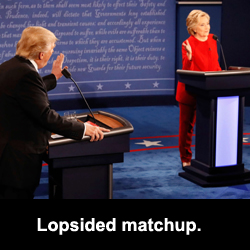 Not-so-great debate. I was witness to the nerve-wracking exchange between former secretary Clinton and Donald Trump, and I have to say that something about seeing the two of them on the stage of a presidential general election debate was disturbing enough even before they said anything. Clinton bested Trump, but that shouldn’t be hard. The guy literally knows nothing about anything. Honestly, the Republican party seems determined to convince people that there’s nothing to the presidency, that any dunce off the street can do the job. Count me among those who do not agree. That rambling wreck Trump would be a total disaster, to borrow one of his favorite turns of phrase. If Monday’s debate proved anything, it’s that.
Not-so-great debate. I was witness to the nerve-wracking exchange between former secretary Clinton and Donald Trump, and I have to say that something about seeing the two of them on the stage of a presidential general election debate was disturbing enough even before they said anything. Clinton bested Trump, but that shouldn’t be hard. The guy literally knows nothing about anything. Honestly, the Republican party seems determined to convince people that there’s nothing to the presidency, that any dunce off the street can do the job. Count me among those who do not agree. That rambling wreck Trump would be a total disaster, to borrow one of his favorite turns of phrase. If Monday’s debate proved anything, it’s that.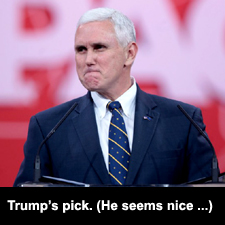 Second, this dumb ass election. The corporate media is obsessing over vice presidential picks this week, for some strange reason (guys …. they are going to announce the names in just a few days – re the fuck lax). Clinton and Sanders did their event together, Bernie burning the house down as usual. It’s not a hard argument to make that, whatever else we do politically, we all need to make certain the wrong person out of the two possible presidential winners never reaches the White House. If the only thing you gain is exponentially better Supreme Court appointments, that in itself is enough reason to mark the ballot for Clinton, at least in swing states. A more reactionary court can do enormous amounts of damage – this we have seen.
Second, this dumb ass election. The corporate media is obsessing over vice presidential picks this week, for some strange reason (guys …. they are going to announce the names in just a few days – re the fuck lax). Clinton and Sanders did their event together, Bernie burning the house down as usual. It’s not a hard argument to make that, whatever else we do politically, we all need to make certain the wrong person out of the two possible presidential winners never reaches the White House. If the only thing you gain is exponentially better Supreme Court appointments, that in itself is enough reason to mark the ballot for Clinton, at least in swing states. A more reactionary court can do enormous amounts of damage – this we have seen.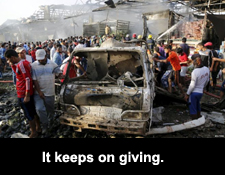 It was a week that started with the obscene bombing in Baghdad, the death toll for which has exceeded 250. As has long been the case, this provoked some small response in American culture because of the magnitude of the crime, but the degree of “hair-on-fire” apoplexy about terrorism has been relatively minimal due to the cultural distance between Iraq and the United States. As these attacks move closer culturally to the U.S., our politicians get more worked up. Forget this export we call “freedom” – that bombing is our gift to the Iraqi people and it just keeps on giving.
It was a week that started with the obscene bombing in Baghdad, the death toll for which has exceeded 250. As has long been the case, this provoked some small response in American culture because of the magnitude of the crime, but the degree of “hair-on-fire” apoplexy about terrorism has been relatively minimal due to the cultural distance between Iraq and the United States. As these attacks move closer culturally to the U.S., our politicians get more worked up. Forget this export we call “freedom” – that bombing is our gift to the Iraqi people and it just keeps on giving.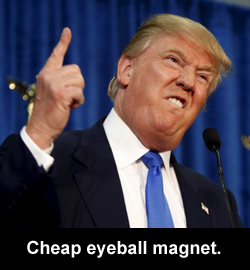 Capitalism’s Failure. This is an issue that touches on everyone, young and old, working and unemployed or retired, poor and not-so-poor. The internal contradictions of American and, by extension, global capitalism came to a head in the crash of 2008, and we are still living in the aftermath of that disaster. Yes, the government can point to select data points that indicated a modest level of recovery, but the fact remains that an economic system that has consistently failed the vast majority of the population over the past 30 years has entered into an entirely new phase of failure. Most working Americans are toiling at the only job they can find, earning an inadequate rate of compensation. Our major cities are choked with legions of homeless people. This system is broken; it only serves the top one percent. We need to take a hard look at this, sooner rather than later.
Capitalism’s Failure. This is an issue that touches on everyone, young and old, working and unemployed or retired, poor and not-so-poor. The internal contradictions of American and, by extension, global capitalism came to a head in the crash of 2008, and we are still living in the aftermath of that disaster. Yes, the government can point to select data points that indicated a modest level of recovery, but the fact remains that an economic system that has consistently failed the vast majority of the population over the past 30 years has entered into an entirely new phase of failure. Most working Americans are toiling at the only job they can find, earning an inadequate rate of compensation. Our major cities are choked with legions of homeless people. This system is broken; it only serves the top one percent. We need to take a hard look at this, sooner rather than later.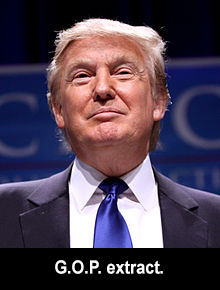 Schumer’s gambit. Senator Schumer has defended his decision to oppose the nuclear deal with Iran by suggesting that a deal more favorable to the U.S. and Israel can be forced through extension and intensification of sanctions and – I suppose – more aggressive negotiations. In this respect, he is channeling Trump. What’s sad about this is that even the administration, in its defense of the pact, buys into the same imperial mindset that has defined our relationship with Iran since 1979.
Schumer’s gambit. Senator Schumer has defended his decision to oppose the nuclear deal with Iran by suggesting that a deal more favorable to the U.S. and Israel can be forced through extension and intensification of sanctions and – I suppose – more aggressive negotiations. In this respect, he is channeling Trump. What’s sad about this is that even the administration, in its defense of the pact, buys into the same imperial mindset that has defined our relationship with Iran since 1979.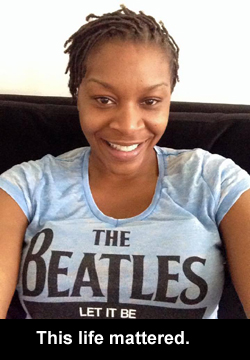 The video of this incident is chilling, and instructive. It is a window into the mentality of entrenched white domination of black people; nothing less than this. Irritation should not be sufficient cause for arrest, whether it’s being projected by the motorist or the arresting officer. Sandra Bland was not doing as she was asked. She was not bowing and scraping. At the same time, she was not violently confrontational. The Texas State Trooper could have just handed her the ticket – or a warning – and walked back to his cruiser. Once he decided to be a dick about it, there was no backing down – not as the white cop disciplining the black miscreant.
The video of this incident is chilling, and instructive. It is a window into the mentality of entrenched white domination of black people; nothing less than this. Irritation should not be sufficient cause for arrest, whether it’s being projected by the motorist or the arresting officer. Sandra Bland was not doing as she was asked. She was not bowing and scraping. At the same time, she was not violently confrontational. The Texas State Trooper could have just handed her the ticket – or a warning – and walked back to his cruiser. Once he decided to be a dick about it, there was no backing down – not as the white cop disciplining the black miscreant.